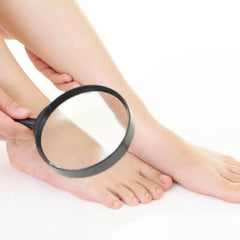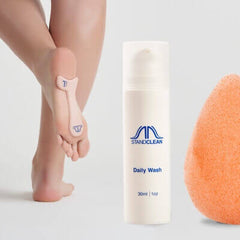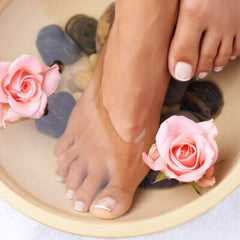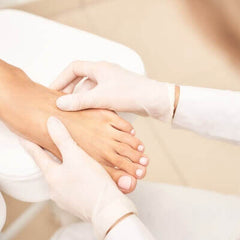
Being diagnosed with diabetes can be overwhelming, but taking care of your feet is essential in managing the condition. Foot problems are common among individuals with diabetes due to nerve damage and poor blood circulation. Understanding how to protect your feet is crucial to prevent complications such as diabetic foot ulcers. Here are some comprehensive tips to help you maintain healthy feet and Stand Strong.

Daily Foot Checks: Make it a habit to examine your feet thoroughly every day for any cuts, sores, blisters, or redness. Use a mirror to see the bottom of your feet if necessary, as nerve damage may reduce sensation and make it difficult to detect injuries. Any abnormalities should be reported to your healthcare provider promptly.
Proper Footwear: Invest in well-fitted shoes that support and protect your feet. Avoid shoes that are too tight, have narrow toes, or have poor cushion in their insoles, as they can cause friction and pressure points and lead to foot problems such as corns and calluses. Opt for synthetic fabric or wool socks to remove moisture and prevent fungal infections. Consider consulting with a podiatrist to get professionally fitted for shoes if needed, and wear Stand Strong arch supports - pink color, to stay comfortable and redistribute pressure on your feet.

Foot Hygiene: Wash your feet daily with warm, soapy water and dry them thoroughly, especially between the toes. Moisturize your feet to prevent dry skin and cracked heels, but avoid applying lotion between the toes to deter fungal growth. Use organic foot powder or cornstarch to absorb excess moisture, particularly in areas prone to sweating. Our Cleanser STAND CLEAN® Daily wash has antifungal properties that help you stand clean every day.

Regular Nail Care: Trim your toenails straight across to prevent ingrown toenails. If you have difficulty trimming your nails or notice any abnormalities, such as thickened nails or color changes, seek assistance from a podiatrist. Avoid cutting into the corners of the nails to prevent ingrown toenails and potential infections.

Maintain Blood Sugar Levels: Keeping your blood sugar levels within the target range is crucial for preventing diabetic foot complications. Monitor your blood sugar regularly using a glucose meter and follow your healthcare provider's recommendations for diabetes management. Consistently high blood sugar levels can contribute to nerve damage and impaired wound healing, increasing the risk of foot problems. As we always recommend the best products to enhance your Health, here is a fantastic supplement from Thorne®: Diabenil - which contains a comprehensive blend of botanicals and nutrients to support healthy blood sugar levels and help protect nerves, blood vessels, eyes, kidneys, and of course, your feet as well. Buy Now Diabenil® - Thorne.
Avoid Going Barefoot: Wear indoor and outdoor shoes to protect your feet from injuries: barefoot walking is risky if you have poor sensation. Avoid walking barefoot or wearing open-toed shoes, as they increase the risk of cuts, scrapes, and infections. Choose shoes with closed toes and good arch support to minimize pressure points and reduce the risk of foot deformities. See Stand Strong Pink Arches for sensitive skin.
Monitor Foot Temperature: Check the water temperature before bathing to avoid burns, as diabetic neuropathy may reduce temperature sensation. Protect your feet from extreme temperatures and use sunscreen to prevent sunburn. Avoid placing heating pads or hot water bottles directly on your feet, as they can cause burns and damage to the skin.

Regular Foot Exams: Schedule regular foot exams with your healthcare provider, ideally at least once a year, to assess your foot health and address any concerns promptly. Your healthcare provider will perform a comprehensive foot examination, assessing sensation, circulation, and skin integrity. They may also provide education on proper foot care and recommend additional interventions such as the Stand Strong arches, custom orthotic inserts or diabetic shoes.
Taking proactive steps to care for your feet is essential for individuals newly diagnosed with diabetes. By incorporating these comprehensive foot care tips into your daily routine and working closely with your healthcare team, you can reduce the risk of diabetic foot complications and maintain overall foot health. Remember, healthy feet are crucial for a healthy life, especially for those managing diabetes.
You are not alone in this new healthcare routine.- Dr. Stand Strong.

Comments (0)
Back to Stand Strong Blog